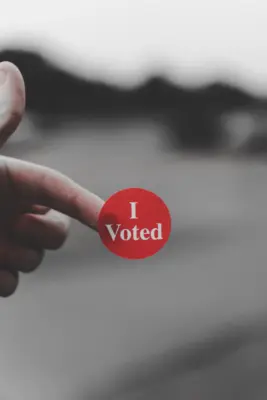
The Feminist Argument for Proportional Representation
I’m passionate about voting. I vote wherever and whenever I have the opportunity. What I don’t love is feeling like my vote doesn’t count or feeling forced to vote “strategically,” not for who I want to win, but against the person I definitely hope will lose.
If you’re in a riding that’s considered “safe,” perhaps you fear that your votes are, ostensibly, wasted. Maybe you’re alienated, not seeing yourself or your community reflected in our political landscape. Possibly, you feel that the deck is stacked against average people, or that the concerns of women, of Indigenous peoples, of marginalized and racialized people, or those living in poverty aren’t being heard, much less represented, in the corridors of power.
A lack of diverse and equitable representation is not the best way to keep a diverse citizenry engaged and participating enthusiastically in our democracy. In fact, along with a general decline in voter turnout, we’re seeing growing disillusionment with party politics and lack of faith in our institutions. Some observers believe that part of what’s to blame is our electoral system itself.
This month, British Columbians have a chance to have our say about whether or not we want a new way to elect our representatives. We have two options: keep our current First Past the Post system (FPTP) or move to a version of Proportional Representation (PR), through three proposed options we can rank by preference in Question Two. These options being: Mixed Member Proportional (MMP), Dual Member Proportional (DMP) and Rural-Urban Proportional (RUP).
It’s likely you have already received your voting package in the mail. But, like a lot of people, you may have some hesitation about choosing to change our electoral system. It may feel like jumping into the unknown.
You end up seeing more women elected and more visible minorities elected. That’s the representation argument.
To make sense of it all, and to find out if there is a feminist argument for PR, I spoke with Seth Klein, BC Director of the Canadian Centre for Policy Alternatives. Over the course of two phone calls over two days (and one failed recording!), Seth shared his enthusiasm for PR and its impact on increasing diversity and equity, and clarified some of the misunderstandings about the perceived drawbacks of electoral reform.

Q: What is proportional representation and how does it address people’s concerns that their votes don’t matter or feelings that they have to vote strategically, against certain candidates instead of for the candidates of their choosing?
A: One of the real problems with First Past the Post is that it makes people feel forced to engage in strategic voting and by strategic voting. I mean, instead of feeling like you can vote for whom you want, you feel compelled to vote against who you most fear or dislike. Also, when the system narrows the debate down to a horse race between two main parties, you just feel like you have to line up behind the party that comes closest to you. One of the huge benefits to switching to a form of pro rep is that it liberates us to vote our values — because you can truly vote for whom you want and know that your vote is not going to be wasted, it’s going to count, [and] it’s going to help elect someone from that party.
Q: Is there a feminist argument for PR? If so, what is it?
A: The feminist argument is multi-pronged. First of all, the evidence is clear across OECD countries, that in countries with pro rep, the make-up of the legislature better reflects who we are. You have more gender balance, you have more ethnic diversity, you have better Indigenous representation. And that’s because any pro-rep system, whether or not it’s list-based, partially list-based, or where parties are fielding multiple candidates in larger ridings — unless it’s a far-right party that prides itself on its white nationalism and patriarchy — a political party would be strategically foolish not to present to the voters groups of candidates who are diverse. You end up seeing more women elected and more visible minorities elected. That’s the representation argument.
[T]he PR system changed the nature of their politics, that it made them more cooperative and collaborative.
There’s also a policy dimension. We know, again for the comparative literature, that pro rep countries have less income inequality, and it’s highly statistically significant. To cite the work of Arend Lijphart, …what he finds when he compares PR countries versus what’s called majoritarian systems like ours, the way he describes it is, he says that PR countries are more caring and more gentle in terms of the kinds of policy choices that are being made.
Incidentally, that doesn’t result in them being more fiscally reckless; the comparative literature also finds that the PR countries have just as strong an economic record, if not stronger. They actually have a record of having less frequent deficits and smaller debt. But they’re making different choices. We know that the PR countries score better on UN Index on Human Development.
There’s another dimension worth considering too, which is how PR changes the way politics is conducted and the toxicity of our politics. An example would be what we heard recently from Helen Clark, former New Zealand prime minister…. When New Zealand was first going through their referendum in the early 1990s, Helen Clark opposed PR, but then she served as prime minister under PR and she became a strong proponent of it. She says what changed her mind was seeing how the PR system changed the nature of their politics, that it made them more cooperative and collaborative.
Another policy benefit of PR is a core problem that we see with First Past the Post is the problem that we call policy lurches, which is that as power shifts back and forth between false majority governments, each government spends a chunk of their time basically undoing the policies of the previous government.
So, you see that playing out right now in Ontario with the Ford government undoing the policies of the Wynne government, you see it in terms of Trudeau undoing Harper, you see it in Trump undoing Obama. It’s extremely inefficient and it’s actually bad for business because your policy environment keeps changing. And, again, under PR, we’d see much less of that because under PR we almost always have minority governments where the governing party has to secure support for its policies that represent a majority of voters.
So, that results in pursuing policies that are built to last. Because they have majority support and that required cobbling together majority support, they are more likely to stand the test of time.
Q: You brought up the example of New Zealand. Can you talk more about what happened in that country?
A: New Zealand is an interesting comparison for us in part because the population is almost the same size as BC, [and] they are a former British colony like us. They chose in the early 1990s, also by referendum, to switch to proportional representation. And in a similar way to the [BC] Attorney General is promising now, they had a confirmation referendum after having two elections under the new system and chose to keep it, to keep PR.
New Zealand is also an interesting story in terms of Indigenous representation. New Zealand has had had designated Maori seats in its legislature for some time, predating the switch to PR. If you’re a Maori person in New Zealand, you have to declare if you’re going to vote for one of the Maori seats or in the general election. Under PR, Maori representation has improved so much that there is an active debate in New Zealand within the Maori community of ditching the designated seats because people’s votes have more weight in the general election than they do for the designated seats.
Designated seats aren’t on the ballot [here in BC]. The full report from the Attorney General does have an appendix around Indigenous representation in which he suggests that we should consider designated Indigenous seats and that there should be a fuller conversation around that after the referendum.
My point is that it’s possible that under PR, we get enough improvement in Indigenous representation that we find that we don’t need that. On the flip side, it’s also possible to combine different PR models with quotas if that’s what the public wanted to do. You could say that parties have to present lists that are gender-balanced, for example. But that isn’t on the ballot right now, it’s not in play.

Q: Critics charge that PR can embolden or empower extremists. Is this a legitimate argument or a bit of fear mongering by those who seek to keep the system working as it currently does?
A: I see a lot of fear mongering from the No side, and in particular they are playing this card that if we move to PR we will be enabling far-right extremists gaining political representation. I think it’s a bogus argument. I think if you actually look at the record, what you see in other countries is that it’s not about the electoral system.
No electoral system has a monopoly on either fostering or preventing the far-right. One of the dangers with First Past the Post is that, while it’s possible under PR that a far-right party might gain a few seats, under First Past the Post, they can actually win power. So, look no further than south of the border now where under the First Past the Post system, Trump lost the popular vote to Hillary Clinton, he comes into the presidency and alt-right elements live in his White House.
Look at what just happened […] in Quebec where François Legault’s CAQ won a majority government, yet again a false majority government with 38% of the popular vote. He did so running on anti-immigrant ideas, dog-whistling to anti-immigrant sentiments, and upon winning that false majority government, he’s stated that he is prepared to use the notwithstanding clause to pursue policies that include the mass deportation of ethnic minorities and the mass firing of religious minorities from the public service.
Is this new? Yes. But, guess what? We get to road test this for two elections.
Are there risks that we’re facing in terms of the far-right and anti-immigrant sentiment? Absolutely. And do we need to confront that? Absolutely. But it’s not about the electoral system.
The other point I would make—and it’s somewhat controversial—is to the extent that those sentiments exist, they will find expression one way or another and if they can’t find political expression in their own fringe parties, they live in our big-tent parties. And in particular, they dog whistle to mainstream conservative parties. And given a choice between those people winning a few seats and knowing transparently what we’re dealing with and how much influence they wield, versus having them live hidden within our big-tend parties and not know how much power and influence they wield, I would actually choose the former.
There is one bulwark against some of this in the regulations from the Attorney General, which is that under all three alternatives, a political party would need to secure a minimum threshold of 5% of the popular vote in order to win seats.
Here’s another safeguard as well, for those who are nervous, which is this: commitment that the Attorney General has put into law that there will be a confirmation referendum after two elections. For me, that should say to people, don’t vote from a place of fear. Is there some uncertainty here? Yes. Is this new? Yes. But, guess what? We get to road test this for two elections. If we don’t like it, or the outcome seems problematic to us, then we get to switch back. So, vote for what you really want and let’s give it a shot.

For more resources on Proportional Representation, visit https://www.policynote.ca/pr4bc/
Basya Laye is Director of Development & Engagement at West Coast LEAF.
Questions? Feedback? Email us at blog@westcoastleaf.org